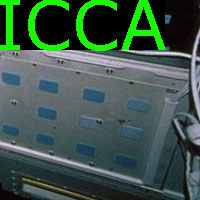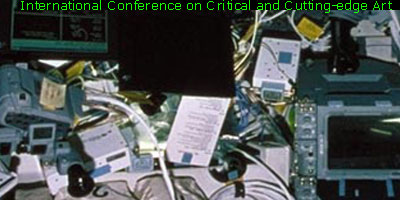
ICCA & Satellite Wrorkshops / the aims and form of the event

The International Conference on Critical and Cutting-edge
Art will be dedicated to exploring the intersections between critical theory,
cutting-edge art and technology. The ICCA will be structured around central
unifying themes of Critical Art and the application of these themes to create
a portable knowledge management systems for artistic and curatorial work.
The aims:
1. the construction of foundations and critic theory
of cutting-edge art, the invention and construction of models and language
to critically describe and code cutting-edge art ideas and activities
2. the discussion of emergent phenomena in critical
and cutting edge art in the context of networking, distributed systems,
complex systems, parallel distributed processing
3. the construction of portable knowledge management environments and their role in artistic and curatorial practice - Free Arts Concepts Exchange
The format
1. Curatorial Colloquium: the sequence of open panel
discussions and debates that manifest 6 topics: * Critical art* Critical
and emergency states * Refugees and witnesses, * Politics of the hack *
Atopia * Curating immateriality (please see details below). The panel discussions
lead by radical curators and specialists in new media art field. It includes
the invention and construction of models and language to actively describe
and code cutting-edge ideas and activieties.
2. Collaboratorium and Radical Coding Workshops: the
open workshop promoting new ways of thinking about code:
* advanced participatory workshop * performative presentations * actions
and interventions. Workshops lead by artists and field-expert practitioners
extend over realms of code and embedded code, environmental code, transmission
and reception, workshops solely utilise free software.
3. Critical reader contains contributions by artists, curators and social scientists who critically analyze the mechanisms at play.(please see attached pdf with bios of participants) All actions will take place simultaneously in Q21: in choosen room but also between spectators in open space: floor, stairs etc.
Politics of hack
| hacker culture | hactivisim and tactical media | concept of art epidemia
| viruses and
spreading infections | crashing & [self] destruction as artwork | neurotic,
irritating, repulsory, neurosis software | free, dysfunctional, radical
agendas | physical data manifestation and generation within a free software
context |
July 18, 2007
Atopia. | myths of telepresents | tele[absence] | art of absence | portability | collaborative, free cooperation | restucturing, reconfiguration, recontextualization | modular software art repositories | environmental code | physical code | tangible code | code bends data |supreme abstraction | formulas and recipes | representation - categories, individuals, relations and values.| protocols | code as/in production | live coding | rapid sampling the data | filtering engines | self-organization | dynamic databases | FACE as a concepts spreading accelarator | combinatorial space | AGI | Supramind | August 2-4, 2007
Refugees and witnesses: | migrations | emigration | order, power | economic tenssions | refugees | witnesses |non-coherent groups and communities | opressed ethnicity andsexuality | anxiety | erotism of migration | block out in social memory | resistance | August 10-23, 2007
Critical and emergency states | cronyism | kleptocracy | bureaucracy and ideology | police and spies | pastoralism | digital colonialism | distributed economic | regressive politics: borders, walls, neon screens, racist and reactionary impulses | progressive politics of movement: accelaration to unknow future, flow of information, trade, activism || outside politics, stateless politics, politics of the hack |
Curating immateriality | myths of immateriality of product | modular software open to the users for further modifications as artwork | curator as producer | automated filtering as curating |
ICCA / the suggested topics of the event
1. Critical and Cutting-Edge Art: critical, performative, participatory acts of exchange via an online hub in which projects do not discriminate between physical and virtual object status, working through a series of critical, social, performative and (free) software-based projects towards the notion of an artistic operating environment, and experimenting with interrogating and overcoming economic, political, and social boundaries in digital and real space.
2. Critical and emergency states: the demands of "national security",
the normalization of violence, and the maintenance of high levels of fear
and anxiety have become part of daily life in the nation states of the so-called
West. McLuhan: "from the egg’s point of view, a chicken is just
a way to get more eggs." We might similarly say that from security’s
point of view, insecurity is just a way to produce more security.
3. Refugees and witnesses: how our society fails to
negotiate the challenges posed by economic globalization, human migration,
and cross-cultural influence.
The concrete social axes of ethnicity, nationalism, gender, and religion.
The polarization of a net into antagonistic fronts — even if these
fronts are not spatially separate. The most non-coherent groups and net
communities using different unique dialects and discourses. The art of making
tactical demands, exploring the potential for new emancipatory thinking
and questioning whether art can be a space to reconceive current forms of
subjection. Against (networked) information/transparency proliferation.
4. Politics of the hack, inventing relations outside
of representation. The interest of the hackers lies first and foremost in
a free circulation of information, this being the necessary condition for
the renewed statement of the hack. Hacking as a pure, free experimental
activity must be free from any constraint that is not self imposed. To hack
is always to produce a difference, if only a second difference, in the production
of information. Hacking art as seeking to permeate existing states with
a new state of existence, spreading the seeds of an alternative practice
of everyday life.
Monopolising intellectual property - patents and brands - and the means
of reproducing their value - the vectors of communication. The insistence
on proprietary models of ownership as a form of slavery, racism and oppression.
5. Atopia. Atopian space is a real enclave within imaginary
social space. The possibility of atopian space is a result of the impossibility
of adequate and effective spatial and social quantification and calculation.
It is not ‘nowhere’ (utopia) or ‘elsewhere’ (heterotopia),
but ‘everywhere’ (atopia). Telesthesia are all forms of presence
or perception at a distance.
6. Curating immateriality: archives, documentation, selling, renting, storage of new media art activities The larger perspective: a stock of information as archive, a body of information maintained through time that has enduring value. The danger of populism: valuation of efficiency of art events by number of spectators
